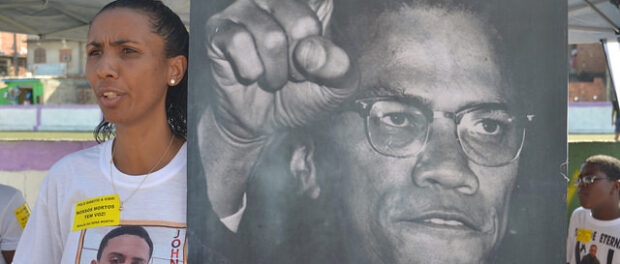
The mothers of victims of violence in favelas called for justice in a powerful protest in Manguinhos Saturday September 13. Holding up photos of the young men killed by the Military Police, around 50 protesters marched with the funk collective Apafunk while asking for peace in their communities.
Jonatha de Oliveira Silva, 19, was shot dead in the back after dropping off a dessert at his grandmother’s house on May 14. He was walking back home when he was met with a commotion that was being dispersed by military policemen shooting into the crowd.
His mother Ana Paula Oliveira, wearing a shirt with her son’s face on it, said at Saturday’s event: “I am here today to ask for justice because my biggest desire is that this violence ends because we see this all the time, young people dying in the community, with no right to come and go in the place where they were born and raised. People don’t have freedom.”
Around 50 people marched to the sound of Apafunk while singing “Eu Só Quero É Ser Feliz” (I Just Want to be Happy) by Cidinho and Doca, which has become the anthem of favela movements. The chorus “I just want to be happy/Walk with tranquillity in the favela where I was born,” called residents to their windows to watch the protest outside.
The march stopped a couple of times to hear from the mothers of the murdered young men and call out their names. Once a name was called, the crowd would respond “Present!” in a gesture to give voice to the dead through the living.

Fátima dos Santos also lost her son, 18-year-old Paulo Roberto, to police violence last October 17, 2013, and says young black men are hounded by the police.
She said: “They are stalked by the police because they live in the favela, they are black and all blacks are thieves, drug traffickers. Paulo Roberto was in an alleyway with his friends, behind his house, and the police were arresting another young man.
“They saw my son and let the other guy go. My son, since he was tall and strong, they grabbed him by the neck and beat him. I got there and he was knocked out, he died suffocated. I want [the police] to be punished and that this doesn’t happen again, that’s it.”
The protest also gathered women who were there for their brothers. Monique Cruz went to the event because she always worries about her brother when he isn’t home because he is the “standard suspect of society.”
She said: “I am here because I live here, I grew up here, and my family has been here for over 40 years and because I have a brother who is black. I am here because I am black, because I am a woman and because these aggressions keep repeating themselves. Even if I didn’t know the boys [who were murdered] personally, looking at them is to look at my brother. I am here because we don’t want this to happen again and we want to show this place has a voice.”

Cruz also says she worries about the favela youth’s right to come and go since the Pacifying Police Unit (UPP) was installed in Manguinhos on January 16, 2013.
“The youth don’t walk around here anymore because they know they will be harassed [by the police] anywhere they go,” she says. “If there are boys who, by some chance, have a police record, they are already stalked by the police and are always accused of committing crimes, besides being black and young.”
Natane da Silva Santos, resident of Complexo da Maré, came to the event planned by mothers because it “gives her strength” to keep fighting for a better society.
“Mothers are where life comes from, and these mothers don’t accept these deaths. The objective of this event is that this violence does not happen again. When mothers fight for their sons, they are also fighting for the favela,” she said.

MC Leonardo, leading the Apafunk collective in song, spoke about the grave dangers of the passive acceptance of violence in Rio de Janeiro.
He said: “A saying we use a lot here in Latin America is that people who don’t move can’t feel the current of the river, so I think that Rio de Janeiro–generally, I am not just speaking of favelas–is still going to suffer a lot to figure out which way the current is going. Because passivity is more violent than the act of violence. We are accepting it. We shouldn’t blame the favelas but make them responsible. If drug trafficking exists it’s because there are many things missing–trafficking is not useful, there’s nothing romantic about it, it is oppressive. There’s nothing beautiful in it but we aren’t solving anything by killing people, because if killing people solved anything, it would have been solved already because we’ve killed way too much.”
The march ended with more speeches from mothers and poetry readings. The Military Police kept an eye on the gathering from a distance while the mothers shared their stories.
